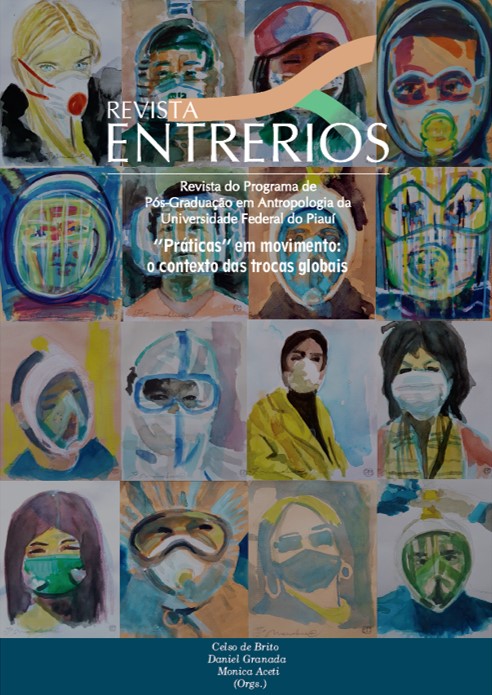A web of orixás: Technology and the transmission of Candomblé songs in Bahia and Berlin
DOI :
https://doi.org/10.26694/rer.v2i2.9696Mots-clés :
Candomblé, bodily knowledge, practical learning, transculturalityRésumé
This paper draws upon ethnographic field research on the transmission of the Afro-Brazilian religion of Candomblé in two contrastive contexts: Recôncavo da Bahia and Berlin. Whereas in the religion's original region, Bahia, people are immersed in what can be considered a universe of orixás – Candomblé’s West-African deities –, in Germany, a country with almost no references of the tradition, a context must be created for its practice. In this sense, technology, and especially the internet, should facilitate the transmission of Candomblé by displaying cultural references, from videos of rituals to lyrics of orixás songs, and connecting migrants and foreigners to its symbology, myths, songs and dances despite the physical distance from Brazil. Paradoxically, although in Bahia technology is considered an additional tool for learning, in Berlin, where references lack, it is a kind of taboo, bringing about controversies in the transmission of knowledge. While unveiling different modes of learning Candomblé’s bodily knowledge, this paper seeks to demonstrate through this paradox the intricacies of practical learning as well as of the interrelation between practice and discourse.
Références
AYOH’OMIDIRE, Félix. Yorubaianidade Mundializada: o reinado da oralitura em textos yorubá-nigerianos e afro-baianos contemporâneos. PhD dissertation, Universidade Federal da Bahia, Salvador, 2005.
BERGER, Peter. L.; LUCKMANN, Thomas. The Social Construction of Reality: a treatise in the sociology of knowledge. New York: Anchor books, 1967.
BOURDIEU, Pierre. Esquisse d'une Théorie de la Pratique: précédé de trois études d'ethnologie kabyle. Genève: Droz, 1972.
________________. Le Sens Pratique. Paris: Éditions de Minuit, 1980.
CAPONE, Stefania. Os yorubás do novo mundo: religião, etnicidade e nacionalismo negro nos Estados Unidos. Rio de Janeiro: Pallas, 2011.
CASTILLO, Lisa E. Entre a Oralidade e a Escrita: a etnografia nos candomblés da Bahia. Salvador, Bahia: EDUFBA, 2008.
CONNERTON, Paul. How Societies Remember. Cambridge, New York: Cambridge University Press, 1989.
FREITAS, Ricardo. O. “Candomblé e mídias digitais: sobre a publicização do sagrado e do privado na Internet”. Revista Tabuleiro de Letras, 13/2 (dez. 2019). p. 158-172.
_____________. “Candomblé e Mídia: Breve histórico da tecnologização das religiões afro-brasileiras nos e pelos meios de comunicação”. Acervo 16/2, (dez. 2011). p. 63-88.
GEBAUER, Gunter.; WULF, Christoph. Mimetische Weltzugänge: Soziales Handeln - Rituale und Spiele - ästhetische Produktionen. Stuttgart: Kohlhammer, 2003.
GOLDMAN, Marcio. “Formas do Saber e Modos do Ser: Observações Sobre Multiplicidade e Ontologia no Candomblé”. Religião e Sociedade, 25(2), 2005: 102-120.
GRAEFF, Nina. “Experiencing Music and Intangible Cultural Heritage: Some Thoughts on
Safeguarding Music’s Intangible Dimension”. El oído pensante, 2(2), 2013: 1-21. http://ppct.caicyt.gov.ar/index.php/oidopensante
_____________. “Ich werde mein Orixá. Mimetische Prozesse in der Weitergabe des Candomblé in Berlin. Paragrana, 23/2, 2014a: 216-228.
____________. “Transmitiendo y preservando lo ‚inmaterial’ en una casa de candomblé en Berlín”. Ensayos: Historia y Teoría del Arte ,25/17, 2014b: 23-37.
____________. Oxum’s mirror: Embodying Candomblé Transculturally. Ph.D. thesis. Free University of Berlin, November 2016.
____________. “Singing by and with heart: embodying Candomblé’s sensuous knowledge through songs and dances in Berlin”. Revista Orfeu 3/2 (2018). p. 44-71.
HALL, Anthony. “From Fome Zero to Bolsa Família: social policies and poverty alleviation under Lula”. Journal of Latin American Studies, 38/04, 2006: 689-709.
KREBS, Stephanie. “The Film Elicitation Technique.” In: HOCKINGS, Paul (org) Principles of Visual Anthropology. The Hague: Mouton Publishers, 1975. pp. 283-302.
LAVE, Jean; WENGER, Étienne. Situated Learning: legitimate peripheral participation. Cambridge, New York: Cambridge University Press, 1991.
LEUSCHNER, Hannes. Die Geister der neuen Welt. Religiöse und soziale Integration von brasilianischen Geistwesen im Candomblé von Santo Amaro, Bahia, Brasilien. Berlin: Lit, 2011.
MATORY, J. Lorand. Black Atlantic Religion. Tradition, Transnationalism and Matriarchy in the Afro- Brazilian Candomblé. Princeton and Oxford: Princeton University Press, 2005.
__________. “The Many Who Dance in Me: Afro-Atlantic Ontology and the Problem with 'Transnationalism”. In: CSORDAS, Thomas (org) Transnational Transcendence. Berkeley: Univ. of California Press, 2009. pp. 231–262.
_________. The Fetish Revisited: Marx, Freud, and the Gods Black People Make. Durham: Duke Univ. Press, 2018.
MERLEAU-PONTY, Maurice. Phenomenology of Perception. Trans. by Colin Smith. London: Routledge & Kegan Paul Ltd, 2005 1945.
MESSIAS, Ivan. S.; DANON Carlos. A. F.. “Internet e Religião: O Candomblé de Youtube”. Revista Psicologia, Diversidade e Saúde, 6/1, fev. 2017: 50-61.
MOORE; Robin.; SAYRE, Elizabeth. “An Afro-Cuban Batá Piece for Obatalá, King of the White Cloth.” In: TENZER, Michael (org) Analytical Studies in World Music. Oxford, New York: Oxford University Press, 2006. pp. 120-60.
OLIVEIRA, Altair B. Cantando para os Orixás. 4. ed. Rio de Janeiro: Pallas, 2007.
ONG, Walter J. Orality and Literacy: the technologizing of the Word. Florence: Taylor and Francis, 2002 [1989].
PEREIRA, Maíra C. A. P.; CAPUTO, Stefania. G.. “Dialogando com narrativas digitais e aprendizagens nos terreiros de candomblé”. Revista Tempos e Espaços em Educação 14, 2014: 45-52.
PRANDI, Reginaldo. Os Candomblés de São Paulo: a velha magia na metrópole nova. São Paulo: Hucitec & Edusp, 1991.
_________________. “O Candomblé e o Tempo: concepções de tempo, saber e autoridade da África para as religiões afro-brasileiras”. Revista Brasileira de Ciências Sociais 16/47, 2001: 43-58.
PREVITALLI, Ivete M. “Tradição oral e novos mecanismos de aprendizado nos terreiros de candomblé”. Revista Brasileira De História Das Religiões 7, 2014. p. 275-287.
SANTOS, Boaventura S. “Beyond Abyssal Thinking: from global lines to ecologies of knowledges.” Review XXX, 1, 2007: 45–89.
SANTOS, Maria Stella de A. Meu Tempo é Agora. 2nd edition. Salvador: Assembléia Legislativa do Estado da Bahia, 2010.
WELSCH, W. “Transkulturalität. Lebensformen nach der Auflösung der Kulturen“. Information Philosophie 2, 1992: 5-20.

















